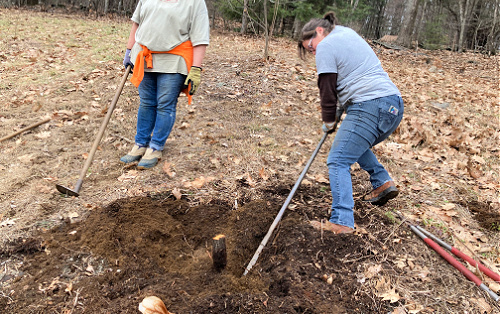To Till or Not to Till
Jack received this trailer from the Real Organic Project for their upcoming annual seminar, watched it and then wrote to Dave Chapman, the founder of the Real Organic Project.
As in any cohort of people, organic farmers debate a lot about whether it is better to till or not to till. We at MHOF sold our rototiller in 2014 and have been retraining ourselves to farm without tillage, after being big tillers for over 30 years. Here is the email conversation –
“Hi Dave,
I was excited to see that you were having this symposium until I watched the trailer. No question that chemical no-till operations are trying to pose as regenerative. But I saw no effort to recognize the value of organic no-till methods.
There was a lot to say careful tillage on organic farms has happened with some carbon build-up, but none to suggest even careful tillage releases carbon. Also I’m sorry to see the pooh-poohing of the overwhelming research outlining the underground carbon transfers between plants and microbes which has emerged recently.
What we need is a clear statement that tillage has been a necessary evil and we are working to stop it without using toxins. Trying to make this black and white (we do no evil, only good) is an error which will catch up with us in the end. Let’s be honest and fight on that battlefield, which is our strongest. Lots of work is being done to replace tillage in organic operations. — Jack Kittredge”
–
“Hi Jack. The trailer was just a very brief glimpse into a very complicated conversation. We have over 50 hours of interviews that we have condensed into about 3 hours. The second session will definitely go into experiments of lo-till with the mid-scale organic farmers in California who have been working with Chico State. We were not able to get into all the trials in small-scale organic no-till. I did interview Bryan O’Hara for the series, but I did not get good footage of him in his fields.
You describe tillage as “evil.” Perhaps it is, but I have serious doubts about that. Not to say that organic no-till isn’t a wonderful system when it works. But I would not describe Eliot Coleman’s tillage as evil. I understand that you are not calling Eliot evil, but I am no longer convinced that all tillage is bad for the soil. Certainly, tillage can be part of a system of soil building that leads to an increase in soil life and organic matter. I know that some disagree with this perspective, but the notion that one point of view is “right” and the other is “wrong” seems like a dangerous place to start any conversation. I actually think that the symposium is an effort to stop making this conversation so black and white. The research on carbon in soil is confusing and often contradictory, to say the least. There are different points of view. We tried to include several no-till academic advocates who ended up declining to participate at the end. We tried to get Tim LaSalle, but again, it just didn’t work out. Please don’t judge the symposium before you see it. I am sure that there will be many who disagree with much of what is said. That is what makes it a discussion. May it be a respectful conversation.
Dave”
–
From Jack –
“Thanks for the quick reply, Dave. I wasn’t sure I had your email address right.
I quite agree we don’t want to start calling each other names yet! And no, I wouldn’t call Eliot evil. But I do think as a thought leader he missed an important opportunity to address carbon loss and tillage when he reissued his book a few years ago and failed to even take the topic up. We don’t have time for any more failures to face uncomfortable truth, whether from oil companies or high tillage farmers.
You really are not convinced that tillage is destructive of soil carbon? Why do you think nature abhors uncovered soil? It is one thing to admit that tillage is a problem and we need to find alternatives. That is honest and productive of research and experimentation. But to try to confuse the issue, or downplay the problem, or claim it is not there is tobacco company behavior. Please don’t take the Real Organic Project there just because folks naturally resist change. We need leadership in this fight.
I’m glad you checked with Bryan and Tim and the Chico people. Their work needs more publicity. I know your involvement with this really started over hydroponics, not carbon. But if we want to fight for soil-based organics, let’s be talking about building the healthiest soil to do that in. – Jack”
–
I sent a response back to Dave after this last email from Jack. No response yet. Julie
“Hi folks,
If you would ever like to interview us here, I would be happy to go into great detail about all that we have learned since we sold our tiller in 2014. We bought a ripper and used it for a couple of years after that but are giving that away this year. We are very excited about how we raise excellent vegetables on 2 acres, also an acre of tree fruit and some small fruit, along with 6 pigs, 250 meat birds, 100 turkeys, and 100 new layers each year, and in an intricate flow. We are certified organic and have been since 1987, probably one of the longest farmers in the country to be certified. And Real Organic too, of course. We use a substantial amount of mulch – going back to Ruth Stout. And we also use state of the art Advancing EcoAgriculture sprays. We are getting back into fermented lactobacillus sprays a la Graeme Sait this year.
I don’t have all the answers, and am each year trying new things and learning more about how to dance that intricate dance. Bet we are no till and believe in it because it has brought us great dividends in quality, quantity, longevity of plants, diminution of disease, etc.
I do think that the spin on your trailer was one of juxtaposing no till with glyphosate against tillage and organic, and I think that was a leading and unfortunate spin.
I am a practicing no till organic farmer and would love to be highlighted by your organization.
Thanks, Julie”
–
We encourage reader responses which we will reprint here. I think controversy, especially among colleagues who are operating in the same world, can be so instructive for all concerned. Julie
Expressing Gratitude this Week
Jack has been working assiduously to write a grant to the State EEA – Executive Office of Energy and Environmental Affairs and got it sent off this week. We have been using a 1930’s walk-in cooler since we started the CSA 32 years ago, and 7 years ago the coolant that it uses became unavailable. This grant award would save us around $20,000 to buy and install a new one. Fingers crossed. Thanks, Jack, and to Maria Ravelli of Community Fridges for the letter of support.
And then there is Melissa Brown, working shareholder and music friend who is so buff and such fun to work with because she always puts her all in.
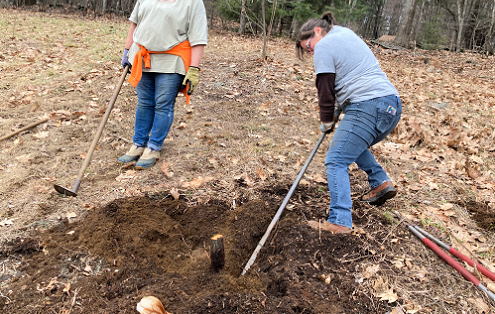
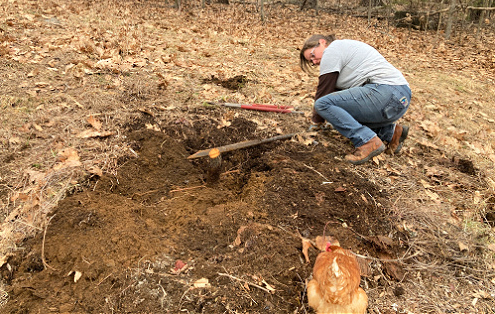
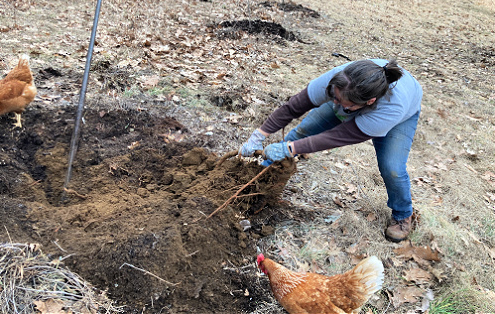
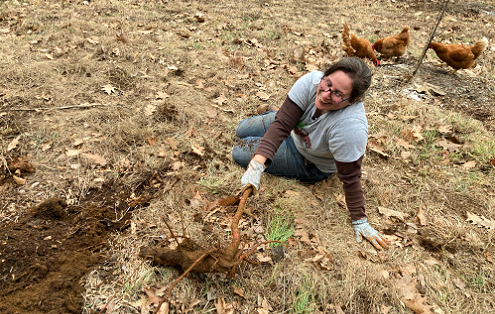
Farm Videos From Last Week
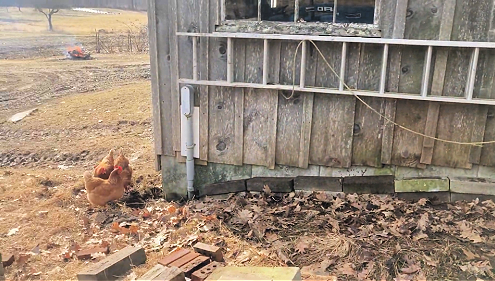
Barn cleanup
Watch video on Facebook
Watch video on Instagram
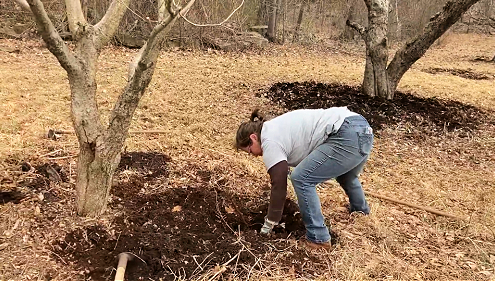
Melissa doing battle with bittersweet
Watch video on Facebook
Watch video on Instagram
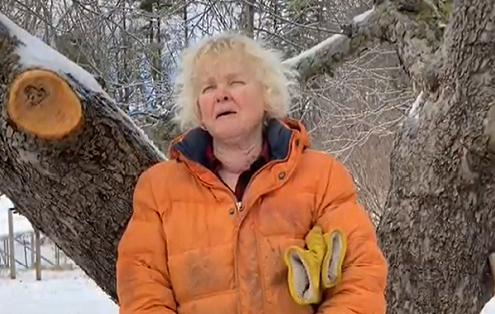
Julie promoting the fruit management workshop being held April 1
Watch video on Facebook
Watch video on Instagram
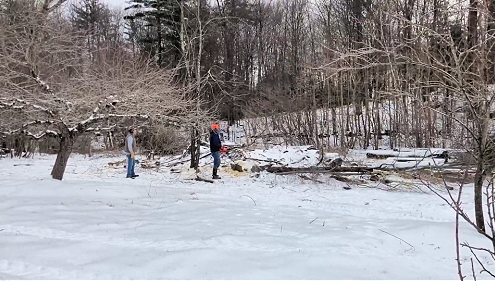
Just two more trees to fell in the rock pile
Watch video on Facebook
Watch video on Instagram
Podcasts from the Outside World
John Kempf’s Regenerative Ag Podcast
Episode #81 with Fred Provenza: https://regenerativeagriculturepodcast.com/
Looking for inspiration? Fred’s voice quality alone does the trick. Jack and I have had some connection with Fred over the years. He is a real gem. His book Nourishment is well worth the read, and it has come out in an abridged fashion on audiobook – slimmed down without all the detail of the 155,000 word written copy.
John Kempf – Forget soil, focus on plant health instead
Lots of good food for thought here. I think he would say that the conversations at the top of this newsletter are somewhat irrelevant! https://youtu.be/JDdWZ_-j97k
Join the 2023 Summer and Fall CSA
We continue to have excellent sales of the CSA shares for 2023. We are itching to get back in the fields, but must wait another month at least. Until then, back to the pruning and perennial management.
We would love to receive your CSA application. Check out all the details here:
Sliding scale – For those of you who want to support a more affordable share for others, you can pay the top of the range. And for those who are of more limited finances, feel free to choose a lower number.
Delivery/handling fee – Trying to make our Paypal options as manageable as possible, we have decided to fold delivery /handling into the share price.
Here are the rates for 2023
Summer large – $750-$850
Summer medium – $550-$650
Summer small – $425-$525
Fall – $170
SNAP pricing
Summer large – $700
Summer medium – $500
Summer small – $400
Fall – $160
SNAP customers reach out to Julie to set up a payment plan.
Pickups all over Central Mass
- At the farm in Barre
- Holden
- Worcester
- Gardner
- Athol
- Warwick
- Sutton
- Shrewsbury
Would you like to help us market the CSA?
We have trifold brochures. We can send you some, or email the master for you to print. Be in touch. We also have 8½” x 11″ posters.
For Sale
Pork for Sale
We will have relatively very little pork available in 2023 because we are cutting back on the number of pigs we are raising. Please get your orders in early to get the best selection. Regular style ribs are already sold out.
Read more here.
We have a limited number of cuts available from our 2022 pigs.
- Roasts – 3-4 lbs. each – $12/lb.
- Sliced Bacon – $18/lb.
- Hams – in the 3 lb. range – $18/lb.
Emails From Readers
Hi Julie,
Thank you for the pork and it was fun to hop in yesterday. This is the
link to this cool stuff working with the earth energies. Electroculture
gardening
Katja
–
Hi Katja,
I think we will try this out in our potato field, placing one on the edge of our potato field far enough away for the other end of the field. It will be curious to find out if there is a difference in growth or yield.
Thanks for sending it along. Julie
Local Education Opportunities
Our friends Ricky Baruc and Deb Habib are offering a line up of workshops in 2023 over at Seeds of Solidarity in Orange. Here is the link – https://seedsofsolidarity.org/workshops-and-events/
Working Shareholders Always Welcome
Pretty soon the weather won’t be iffy and it is a good time to come and get your feet wet as a working shareholder. Feel free to contact me to give it a one morning trial (Monday or Friday) to see if becoming a working shareholder is right for you.
Ways to Donate to MHSC
Many Hands Sustainability Center – our farm non-profit
Many kind folks have been making an annual donation to the MHSC (read about it here – https://mhof.net/many-hands-sustainability-center/) since 2007 through the present. This goes into our general operations of the MHSC and usually helps pay for hiring an outstanding Stetson School student. Recently the MHSC has helped with funding the publication of this newsletter which utilizes significant resources to publish each week. If you are interested in donating to special programs that help make our high quality food available to folks with lesser means, you are welcome to donate to these two programs below.
Community Fridges
We have been donating food to this elegantly simple project in Worcester whereby four refrigerators are stocked with fresh produce from volunteers, and those in need shop for free at these locations. I had a good meeting with Maria Ravelli of Community Fridges. They are in for next year and will be fundraising on their end to keep this enjoyable partnership going. We received our first Community Fridges donations this year. Thank you, Becky, this week. We have raised $1,350 so far.
SNAP support
SNAP recipients are encouraged to use SNAP and Healthy Incentive Program funds to purchase a MHOF CSA share. We work with around 20 of those customers each year and provide a slightly discounted share to these folks. A total of $1,000 in donations will help us defray the costs of providing this assistance to these valued shareholders.
Workshops at MHOF
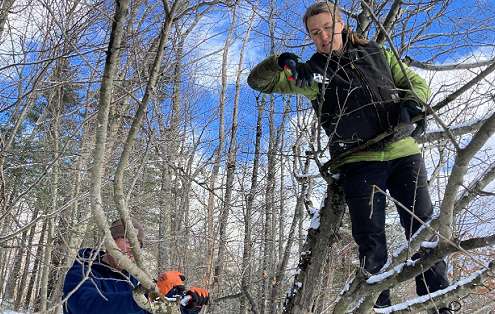
Pruning and Managing an Orchard
Trees, Grapes and Small Fruit
Saturday, April 1, 2023, 10 am – noon followed by potluck lunch
Few things agricultural give you as much joy and satisfaction as a bountiful crop of healthy fruit. Yet it takes a few years of time and steady effort to achieve these results. Make sure that time is well spent! Learn how to manage and prune tree fruit, berries, and grapes at our Spring workshop. We have 100 trees in our orchard and produce apples, pears, peaches, paw paws, mulberries, grapes, blueberries and raspberries every year. We will discuss our fertility management practices and share our foliar and drench recipes. This is a hands-on event. We will supply tools. Cost: Sliding Scale: $25-$75 per person. Register here.
Other Upcoming Workshops
- Building and Using a Chicken Tractor – Saturday April 22, 2023, 10-12 followed by potluck lunch; $25-$75
- Growing Shiitakes Mushrooms on Logs – May 15; 10-12 with potluck lunch; $25-$75; Jonathan and Clare to lead
- MHOF vegetable production intensive (all day) – June 10; 10-3 with pot luck lunch; $50-$100; Clare and Julie to lead
- The Permaculture Farm and Agroforestry hedgerows – June 24; 10-3 with pot luck lunch: $50-$100; Jono Neiger to lead
- Cooking with your CSA share – July 22; Clare and Julie to do this one. 10-noon with complimentary lunch; $25-$75
- Food preservation – September 16, Julie, Clare and Jack; 10-2 with pot luck; $50-$100
Register here
Farm Doin’s
Monday was another beautiful spring day and we were able to do some significant clearing out of bittersweet in our home orchard. It became clear to me as Laurie and Melissa and I worked, that there is a substantial underground network of bittersweet in that orchard. We trimmed it from where it was growing up trees, and then cut it back in a 4 foot radius under each tree. Later we will have to stay current with mowing the roadways to slow down the volunteers that are coming up all over the orchard floor. It was educational to spend the time to really see how it works and the strength of conviction that it has to grow and thrive. Oh that we could all have the tenacity of invasives in the service of humanity!
Stu and Jonathan made more progress on the rock pile/tall trees that are blocking sunlight on the east side of that orchard. We also had some fun cleaning up the north edge of the barn and also picked up a bunch of errant rocks and took them to the rock pile at the back of the south field, finishing with reorganizing our lumber pile.
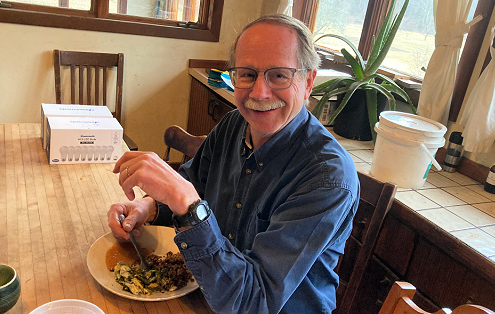
Stu enjoying a bit of breakfast before work
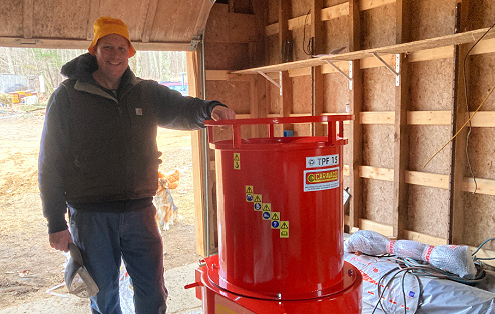
Jonathan showing off our new bale chopper
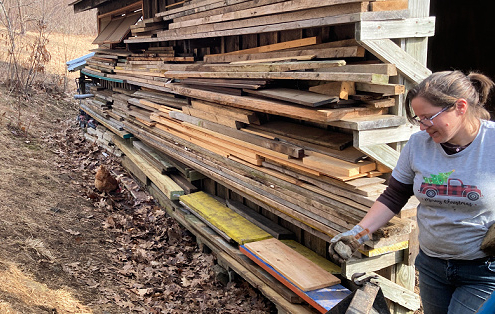
Look at that nice stack of wood
Thursday Jonathan wasn’t able to get here due to the icy weather, so more desk work for me.
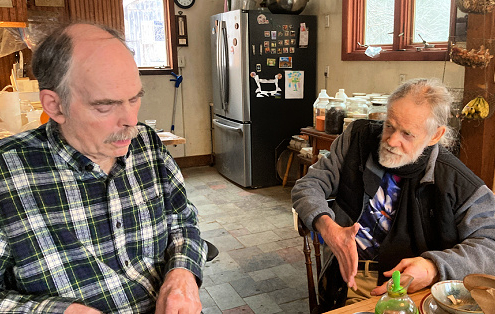
Jack and visiting dignitary David Yarrow discussing resonance, electroculture and other esoteric concerns.
And then on Friday we were finally plunged into winter with ample snow and ice and strong winds. I was a bit relieved, actually, that we are getting some winter. We chipped a bunch of those trees that we had so carefully cleaned on Monday, but had to stop when we got the hill because it was too treacherous. We then returned to the rock pile and Jonathan took down some more trees while Matt and Leslie and I cleaned up after him. They all went on to split wood while I entertained a couple of students from WPI.
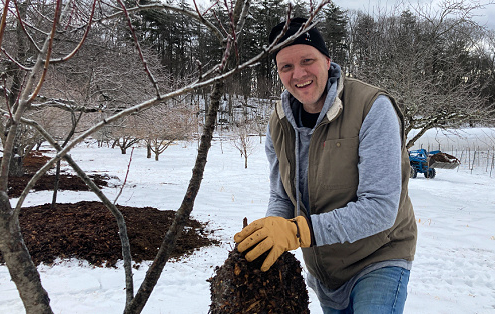
Matt Manhandling a big piece of frozen woodchips
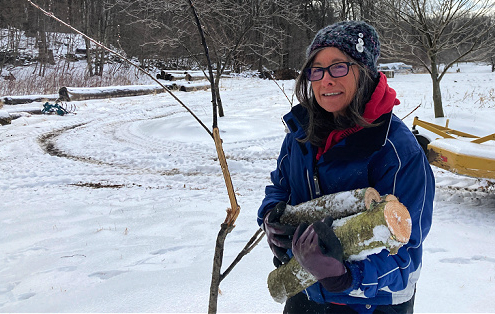
Leslie hauling wood. Note the poor peach tree that took it in the chin when an errant tree fell on it! Sorry, Clare.
Enjoy winter next week again!
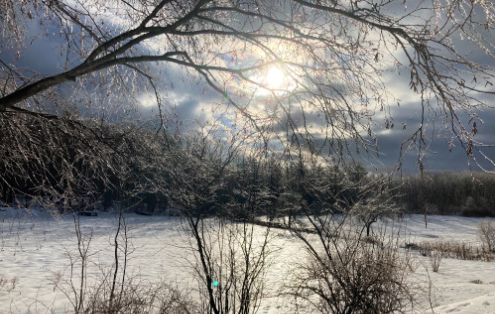
Julie
Quick Links
Buy CSA
Buy meat
CSA pick up information
Contact Julie
Products available right now at the farm
Become a working shareholder

